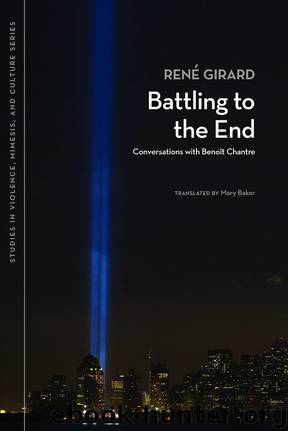Battling to the End by René Girard

Author:René Girard
Language: eng
Format: epub
ISBN: 9781609170332
Publisher: Michigan State University Press
Published: 2010-03-03T16:00:00+00:00
“NEAR IS / AND DIFFICULT TO GRASP, THE GOD”
BC: Could it be the thought about this difference and this resemblance that is at the heart of apocalyptic reason?
RG: Exactly. Proof that it is possible to link eschatology with the modern period, and that I am not falling into the “metaphor trap,” is provided in Hölderlin’s work. His writings have haunted me for a long time, though I have rarely had the occasion to dwell on them. They suddenly come to mind because they are at the heart of the French-German junction. It is through Hölderlin, and no one else, that we can understand what was happening at Jena in 1806.
This was a decisive date. It was when Hegel saw “the world-spirit on horseback” from his window, and Clausewitz drew nearer to the “god of war.” At the same time, Hölderlin was sinking into what was soon to be called his “madness.” These three events occur in the same year, and only the long train of thought on which we have embarked can bring them into perspective. Hölderlin withdrew for 40 years into a tower owned by a carpenter in Tübingen. He had visitors, and people spoke with him, but his host said that he spent entire days reciting his works and even prostrated in total silence. Hölderlin stopped believing in the Absolute, which was not the case of his friends from earlier times: Fichte, Hegel and Schiller. However, he never gave signs of excessive madness. We have to rise to the nobility of this silence.
Hölderlin is much less haunted by Greece than we have been led to believe. I see him instead as frightened by the return to paganism that infused the classicism of his time. He is thus torn between two opposites: the absence of the divine and its fatal nearness. This marked two of his major works: Hyperion: Or the Hermit in Greece (1797–99) and The Death of Empedocles (1798–1800). Hölderlin’s soul oscillates between nostalgia and dread, between questioning a heaven that is now empty and leaping into a volcano. By contrast, all of his friends are so troubled by the absence of gods whose return they desired so ardently. Yet the gods are dead for very specific reasons, which are clearly related to destabilization of the sacrificial mechanism. We have seen that the acceleration of history makes these reasons tangible. The absence of the gods and the presence of the absolute are related themes: the first leads to the second. If heaven is empty, how can we people it? As we have seen, Nietzsche asks that question in aphorism 125 of The Gay Science. Hölderlin’s contemporaries looked to Greece to fill in the vacuum. Hölderlin also let himself fall into that trap for a while, but his withdrawal and immense sadness reveal greater lucidity.
BC: How would you define his apocalyptic thought?
RG: Let’s go straight to the beginning of one of Hölderlin’s greatest poems, appropriately named “Patmos.” Its lines have been commented upon many times, especially since Heidegger saw in it the “enframing” of the world by technology.
Download
This site does not store any files on its server. We only index and link to content provided by other sites. Please contact the content providers to delete copyright contents if any and email us, we'll remove relevant links or contents immediately.
The remains of the day by Kazuo Ishiguro(8999)
Tools of Titans by Timothy Ferriss(8395)
Giovanni's Room by James Baldwin(7346)
The Black Swan by Nassim Nicholas Taleb(7129)
Inner Engineering: A Yogi's Guide to Joy by Sadhguru(6794)
The Way of Zen by Alan W. Watts(6614)
The Power of Now: A Guide to Spiritual Enlightenment by Eckhart Tolle(5781)
Asking the Right Questions: A Guide to Critical Thinking by M. Neil Browne & Stuart M. Keeley(5775)
The Six Wives Of Henry VIII (WOMEN IN HISTORY) by Fraser Antonia(5515)
Astrophysics for People in a Hurry by Neil DeGrasse Tyson(5189)
Housekeeping by Marilynne Robinson(4447)
12 Rules for Life by Jordan B. Peterson(4304)
Ikigai by Héctor García & Francesc Miralles(4274)
Double Down (Diary of a Wimpy Kid Book 11) by Jeff Kinney(4272)
The Ethical Slut by Janet W. Hardy(4251)
Skin in the Game by Nassim Nicholas Taleb(4248)
The Art of Happiness by The Dalai Lama(4130)
Skin in the Game: Hidden Asymmetries in Daily Life by Nassim Nicholas Taleb(4006)
Walking by Henry David Thoreau(3962)
